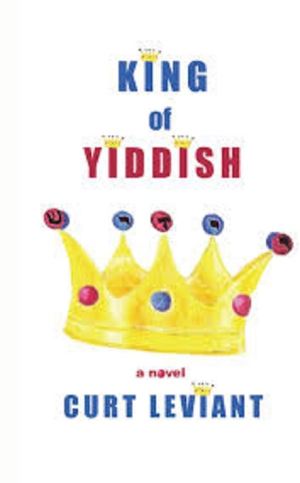King of Yiddish
A story about a Holocaust survivor seeking vengeance showcases Leviant at his absurdist best.
Beneath the linguistic panache and magical realism of Curt Leviant’s endlessly consumable King of Yiddish lie complex questions of family identity, vengeance, and redemption. With all of the flair and erudition for which his previous works are notable, Leviant presents an atypical story about a Holocaust survivor with an ax to grind.
Shmulik Gafni brims with mentshlekhkeyt: he is the world’s premier Yiddish scholar, prolifically published and congenitally curious, masterfully skilled at increasing the value of the university library’s collection, and absolutely faithful to his wife, Bathsheba, despite the temptations presented by a buxom Polish PhD student, Malina. He also frustrates his community terribly: they suspect him of affairs with his underlings, they do not understand why he must spend so much time in haunted Poland, and they really do not think he’s taking his Judaism quite seriously enough.
Gafni has no time for the middling concerns of gossipy Israelis, though. Since his youth, he’s been determined to find the broad-faced Pole who murdered his father and his uncle in a post-Holocaust pogrom. Retribution undergirds his trips abroad. In Warsaw synagogues where the letters of the shema and HaShem rise like fire before the eyes of those who refuse to die, and along the streets of former shtetls where he must assume the despicable disguise of his enemy, he seeks out clues, propelled by the conviction that he’ll achieve his revenge someday.
If the pull of this plot were not strong enough on its own, Leviant’s style would supply any missing temptations. His prose is self-referential—do not read this chapter! Do see the author’s handiwork here!—and playful, with early chapters reading like a frenzied yeshiva discourse, if less Torah- than Shmulik-centered. A thimble-sized incarnation of Mozart plays the Leviant-requisite role of a historically significant, improbable guide (and source of levity). Malina’s sexual appeal devolves into something more crude once she’s secured her prize, her transformation wreaking satirical havoc on questions of intermarriage. The novel achieves perfect balances between the absurd and the reverent, the philosophical and the downright silly.
As satisfying as a conclusive end to a lifelong quest, King of Yiddish is Leviant at his absurdist best.
Reviewed by
Michelle Anne Schingler
Disclosure: This article is not an endorsement, but a review. The publisher of this book provided free copies of the book to have their book reviewed by a professional reviewer. No fee was paid by the publisher for this review. Foreword Reviews only recommends books that we love. Foreword Magazine, Inc. is disclosing this in accordance with the Federal Trade Commission’s 16 CFR, Part 255.

